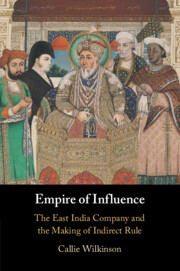Book contents
- Empire of Influence
- Empire of Influence
- Copyright page
- Dedication
- Contents
- Figures
- Maps
- Acknowledgements
- Note on Translation and Transliteration
- Chronology
- Abbreviations
- Additional material
- Introduction
- 1 A Time of Trouble
- 2 Negotiating the Disinformation Order
- 3 Warfare and ‘Wanton Provocations’
- 4 The Price of Pageantry
- 5 Weak Ties in a Tangled Web
- 6 Kinship, Gender, and Dynastic Dramas
- Conclusion
- Glossary
- Bibliography
- Index
2 - Negotiating the Disinformation Order
Published online by Cambridge University Press: 23 March 2023
- Empire of Influence
- Empire of Influence
- Copyright page
- Dedication
- Contents
- Figures
- Maps
- Acknowledgements
- Note on Translation and Transliteration
- Chronology
- Abbreviations
- Additional material
- Introduction
- 1 A Time of Trouble
- 2 Negotiating the Disinformation Order
- 3 Warfare and ‘Wanton Provocations’
- 4 The Price of Pageantry
- 5 Weak Ties in a Tangled Web
- 6 Kinship, Gender, and Dynastic Dramas
- Conclusion
- Glossary
- Bibliography
- Index
Summary
Political intelligence was vital to the Company’s subsidiary alliance system; to enforce it, Residents needed to be able to identify when its conditions were being breached. Yet, the Residents’ papers indicate that the problem was not so much collecting intelligence as determining how to use it. Fraud, or the possibility of fraud, was an important consideration; Residents devised elaborate strategies for identifying forgeries as well as for managing the composition and transmission of letters at court. News passed by word of mouth proved even more ungovernable. Residents were prone to distrust rumour, viewing it as either idle gossip or as insidious disinformation propagated by enemies. Still, they sometimes had no choice but to engage with rumour, particularly when allegations of Company brutality circulated in the streets. Mistrust might have been a common feature at royal capitals, but it also permeated the Residents’ relationship with his superiors in the Company. Residents sometimes misrepresented their activities as a means of shoring up their authority, but they also relied on keeping lines of communication open; frequently, it was Calcutta that remained frustratingly silent. In sum, though gathering and disseminating intelligence was one of the Residencies’ primary functions, fulfilling this responsibility was never simple.
- Type
- Chapter
- Information
- Empire of InfluenceThe East India Company and the Making of Indirect Rule, pp. 63 - 108Publisher: Cambridge University PressPrint publication year: 2023

